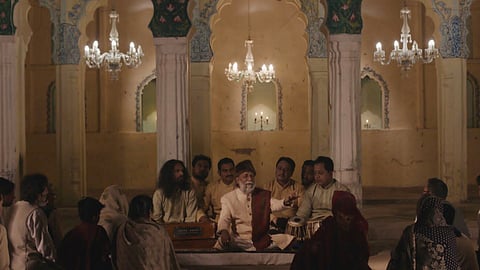
- HOMEGROWN WORLD
- #HGCREATORS
- #HGEXPLORE
- #HGVOICES
- #HGSHOP
- CAREERS
- ABOUT US
- CONTACT US

"Grief, I've learned, is really just love. It's all the love you want to give, but cannot. All of that unspent love gathers in the corners of your eyes, the lump in your throat, and in the hollow part of your chest. Grief is just love with no place to go."
— Jamie Anderson.
The most difficult conversation in any kind of loving relationship revolves around death. Even the thought of the death of a loved one shakes us to the core. It's also something that every person inevitably has to go through; the death of a parent. We may all see it and experience it differently but the lasting effect of grief, nostalgia, and memory that envelopes us when it happens is pretty universal. Delving into this essential life experience, a short film takes a look at care and neglect, music and silence, and life and death through a humanistic lens.
Written and directed by Nimit Kaushik as his graduation film at the London Film School, 'Haalat-e-noom' is the story of 25-year-old Meera who finds herself in a dilemma when she has to deal with her father, Manoj who is completely oblivious to his fast-deteriorating health. A level-4 cirrhosis patient, Manoj gets into an argument with his wife Gayatri about his alcohol intake who is urging him to stop in light of his illness. Meera, who cannot keep the stoic façade anymore, finally takes the leap and confronts her father asking him the tough questions. This emotional journey about a dysfunctional family and addiction also takes us in and out of an elegant gathering of Sufi mystics singing Ghazals and Qawwali music that poeticize the themes of choosing life over death.
Listen to the soundtrack of the film here.
Nimit worked with a lot of talented artists in the ghazal and qawwali world, Shivargh Bhattacharya and Pranjal Varshney (Composers), Salman Khayaal (Lyrics) and Gulam Kasim (Qawwal), shuffling between Lucknow, Delhi, Rae Bareli, and London. You can check out a short BTS documentary of the making of the soundtrack for Haalat-e-noom below.
Ghazals are a form of amatory poem in Arabic poetry that often deal with topics of spirituality and love and may be understood as a poetic expression of both the pain of loss or separation from the beloved. And Qawwalis are a form of Sufi Islamic devotional singing; a way to bring members of the order into a trance-like state that makes them more aware of their relationship with God. Both of these forms of music reinforce the themes explored in the film — love, fear of loss and a life-affirming awakening that's often experienced by people lost in the transcendental states of music.
"I am interested in silences more than words. They are more telling, they speak more. Silences are the most evocative when the conversation is about grief or death. I feel like I have barely scratched the surface of understanding what grief really is, and in my writing, I have almost always circled back to trying to find answers to my questions about death. This film poses a question. 'Would you talk about death with the people you love the most?' I am interested in a character who would. Her rational self would want to be ready for a possibility where her loved ones are no more, and she has to carry on. I am fascinated by this character because I am the total opposite of her. I wouldn’t ever be able to have that talk. Through the journey of this film, I intend to understand grief better and myself better. I hope my questions, in the form of this film, find their answers," shares Nimit.
Follow the film here to know more.
